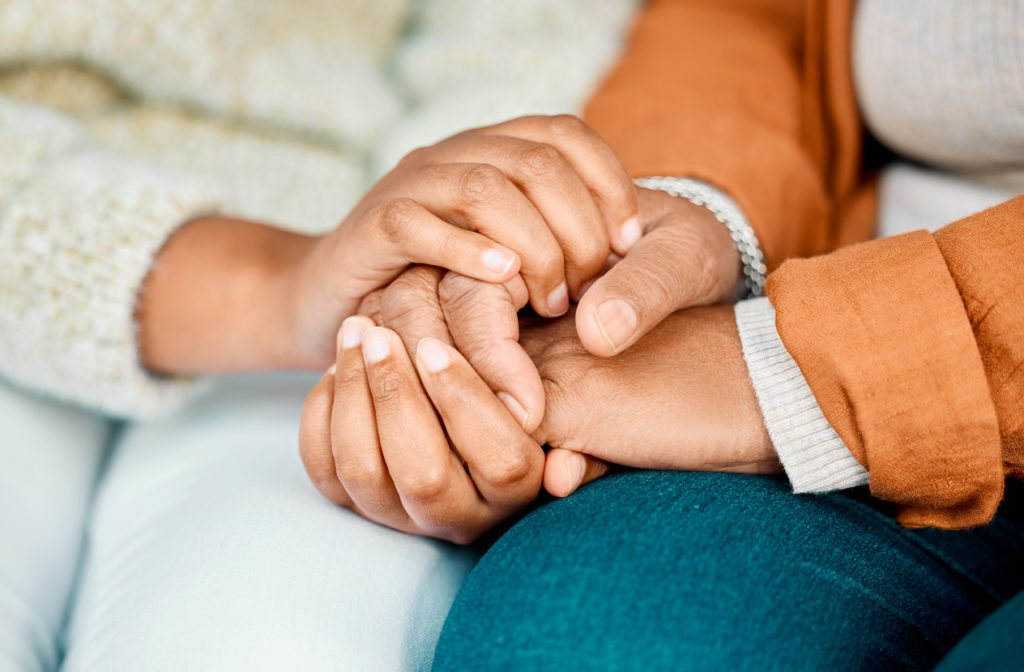

BALTIMORE, Md. (BP) – Anxiety is widespread among teenagers. If you lined up 100 teenagers between the ages of 13 to 18, you could expect approximately every third teenager (31 percent) to experience an anxiety disorder at some point in their teen years. And almost every 10th teenager (8.5 percent) would experience anxiety that causes severe impairment.[i] As the parent of an anxious teen, you may feel a sense of fear, uncertainty, or powerlessness. How can you help? What if you can’t help? How severe is your child’s anxiety? At what point should you consider counseling?
Perhaps you even feel a sense of frustration. Wouldn’t your child feel less anxious if he would listen to you and stay off his phone? Or maybe you have stepped into “fix-it mode,” searching for causes and next steps to take. You want your child to find relief, so your natural tendency may be to brainstorm solutions and offer suggestions of what you think will help. While suggestions can be helpful, oftentimes the best place to start is by having an open and ongoing conversation with your teen about their experience. Here are some questions to help you begin.
Questions to get the conversation started
What is anxiety like for you? Many teenagers don’t realize when they are anxious. Their back tension, racing thoughts, counting rituals, insomnia, nervous energy or other anxiety symptoms feel normal because these experiences are the only thing they know. Teenagers often need help verbalizing their anxiety symptoms so they can begin to recognize when they are anxious. Ask specific questions to help them gain awareness. What does anxiety feel like for them? What thoughts race through their minds? Where do they notice anxiety symptoms in their bodies?
What seems to trigger your anxiety? Teenagers also often need help connecting their anxiety to specific situations in their life. Is the tension in their shoulders related to homework? Do the racing thoughts occur when they spend too much time on the phone? Does the anxiety tend to happen at a certain time of day, in a specific location, or around particular people? Ask questions to help your child begin to make these connections.
When is the first time you remember feeling anxious? You can also investigate when the anxiety first started and what was happening in your child’s life at the time. The onset of anxiety can often be traced back to distressing events such as a parent’s divorce, an experience of bullying, or the death of a family member. The impact of events such as these can linger for many years. Sometimes, present symptoms of anxiety can be resolved when teenagers have the chance to process past distressing experiences.
How do you think your habit of _______ impacts your anxiety? Many teenagers have bad habits that make their anxiety worse. Don’t we all? Parents often recognize that their teenagers would feel better if they would go to bed at a more reasonable time, stay more active, spend less time on the phone, or stop other stress-inducing habits. But how can you help teenagers make important changes if they bristle the moment these topics are mentioned? While you may need to enforce rules surrounding certain problem areas, it’s often best to start by helping teenagers assess their habits for themselves.
Teenagers need to begin taking ownership of how some habits such as isolating, talking to certain friends, overusing social media, or binge-watching TV impact their anxiety. Help them investigate areas such as these by framing your concerns as questions, instead of statements or lectures. For example, how does it affect them when they spend the afternoon on TikTok? If they notice that it negatively affects their anxiety, what do they want to do about this?
Are there any calming activities you would like to use as an alternative to habits you realize may be problematic? Small changes such as getting outside for regular walks, taking five minutes a day to breathe deeply, or taking breaks from homework can make a difference. Talk about some possible changes, but don’t send them off to implement these practices alone. Go with them. Go on that walk together. Breathe deeply together. Stay off social media together. Go out of your way to communicate that you are on their side and in this struggle with them.
How does your relationship with God help you when you feel anxious? And if it doesn’t seem to help, how are you making sense of that? The way we frame conversations about anxiety and faith with teenagers is important. Teenagers are often black-and-white thinkers. They sometimes misinterpret our encouragements to “bring their anxiety to God” as pressure to simply pray harder and read their Bibles more. They can then feel guilty, confused, or angry when they do these things and still feel anxious.
Instead of asking a teenager “are you praying?” or “are you reading your Bible?”, we need to make the connection between anxiety and faith more compelling. More invitational. More honest about the mysterious ways God does and doesn’t work through Scripture and prayer. Less focused on hints of legalism and more focused on the relationship we can experience with the Lord.
God does not stand over us and demand that we pray more and read our Bibles more when we are afraid. Rather, we get to go to Him for help. We get to be completely honest with Him about our experience. How can you help your teenager grasp this comfort? This is an opportunity to share your own experience of how you go to the Lord when you feel afraid.
Do you want to try counseling? Some teenagers fight the idea of counseling. Other teenagers want counseling but hesitate to ask for it because they have real or imagined fears about how a parent may respond. It’s worth initiating the conversation to see if counseling has crossed their mind. If they do desire counseling, always honor this request.
Is there anything that I am doing or anything that is happening in our home that makes you feel more anxious? This is a difficult question to ask, but I encourage you to go here. You may or may not agree with what your teenager says, but either way you will gain valuable information. It’s important to assess how the atmosphere of your whole household affects your teenager’s anxiety. Children are like sponges, absorbing their parent’s energy and emotions. This is especially true of young children, but we can’t ignore how teenagers also soak up the emotions of adults. When a parent feels anxious, angry, stressed, or worried, a teenager picks up these feelings. When a parent feels calm, a teenager absorbs this sense of peace.
So when you notice anxiety in your teenager, it’s always an invitation to consider your own inner life. If you find anxiety, fear, worry, or stress within yourself, it’s likely affecting your teenager as well.
However, before you discuss with your teenager the questions listed above, consider answering them for yourself. Do you know when you are stressed or anxious? Are you using the habits you encourage your teenager to use? Sometimes helping your anxious teenager begins with addressing your own inner struggle.
Exploring your own anxiety should not lead to discouragement or self-criticism, though. We all feel anxious at times. Rather, beginning with yourself may be a needed invitation. God has given you an opportunity to slow down and nurture your own anxious heart. As you do so, you will become more equipped to understand and help the anxious teenager in your care.
[i] https://www.nimh.nih.gov/health/statistics/any-anxiety-disorder
Esther Smith, M.A., is a biblical counselor at Life Counseling Center Ministries and is a licensed clinical professional counselor in the state of Maryland. She is the author of Chronic Illness: Walking by Faith, co-author of The Whole Life, and has been published in the Journal of Biblical Counseling. Esther and her husband live near Baltimore, Maryland.
















